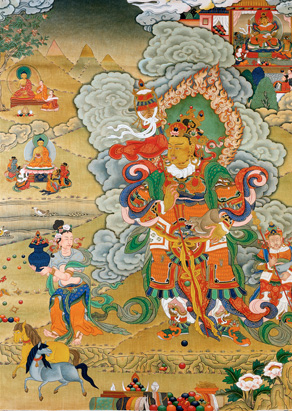Vaishravana: Difference between revisions
Jump to navigation
Jump to search
No edit summary |
mNo edit summary |
||
| Line 1: | Line 1: | ||
[[Image:VaisravanaTST.jpg|frame|'''Vaishravana''']] | [[Image:VaisravanaTST.jpg|frame|'''Vaishravana''']] | ||
'''Vaishravana''' (Skt. Vaiśravaṇa; Tib. Namtösé; [[Wyl.]] | '''Vaishravana''' (Skt. Vaiśravaṇa; Tib. Namtösé; [[Wyl.]] ''rnam thos sras''; Eng. 'Son of He who has Heard Many Things') — one of the [[Four Great Kings]]. Guardian King of the '''North''' and leader of the [[yaksha]]s. | ||
Wearing golden armour, Vaishravana protected the gods from the [[ | Wearing golden armour, Vaishravana protected the [[gods]] from the asuras ([[demi-gods]]). | ||
Vaishravana now occupies the highest position among the Four Guardian Kings and specifically protects [[Shakyamuni]]’s [[Vinaya]] teachings, protecting those who practise ''shila'' (self-[[discipline]]). | Vaishravana now occupies the highest position among the Four Guardian Kings and specifically protects [[Shakyamuni]]’s [[Vinaya]] teachings, protecting those who practise ''shila'' (self-[[discipline]]). | ||
Revision as of 20:09, 3 September 2008

Vaishravana (Skt. Vaiśravaṇa; Tib. Namtösé; Wyl. rnam thos sras; Eng. 'Son of He who has Heard Many Things') — one of the Four Great Kings. Guardian King of the North and leader of the yakshas.
Wearing golden armour, Vaishravana protected the gods from the asuras (demi-gods).
Vaishravana now occupies the highest position among the Four Guardian Kings and specifically protects Shakyamuni’s Vinaya teachings, protecting those who practise shila (self-discipline).
Because his breath is harmful he keeps his mouth tightly closed. He confers spiritual and material wealth on practitioners of the Dharma, symbolized by the jewel-producing mongoose in his left hand.
For more details see Crystal Mirror, volume VI, Dharma Publishing 1984